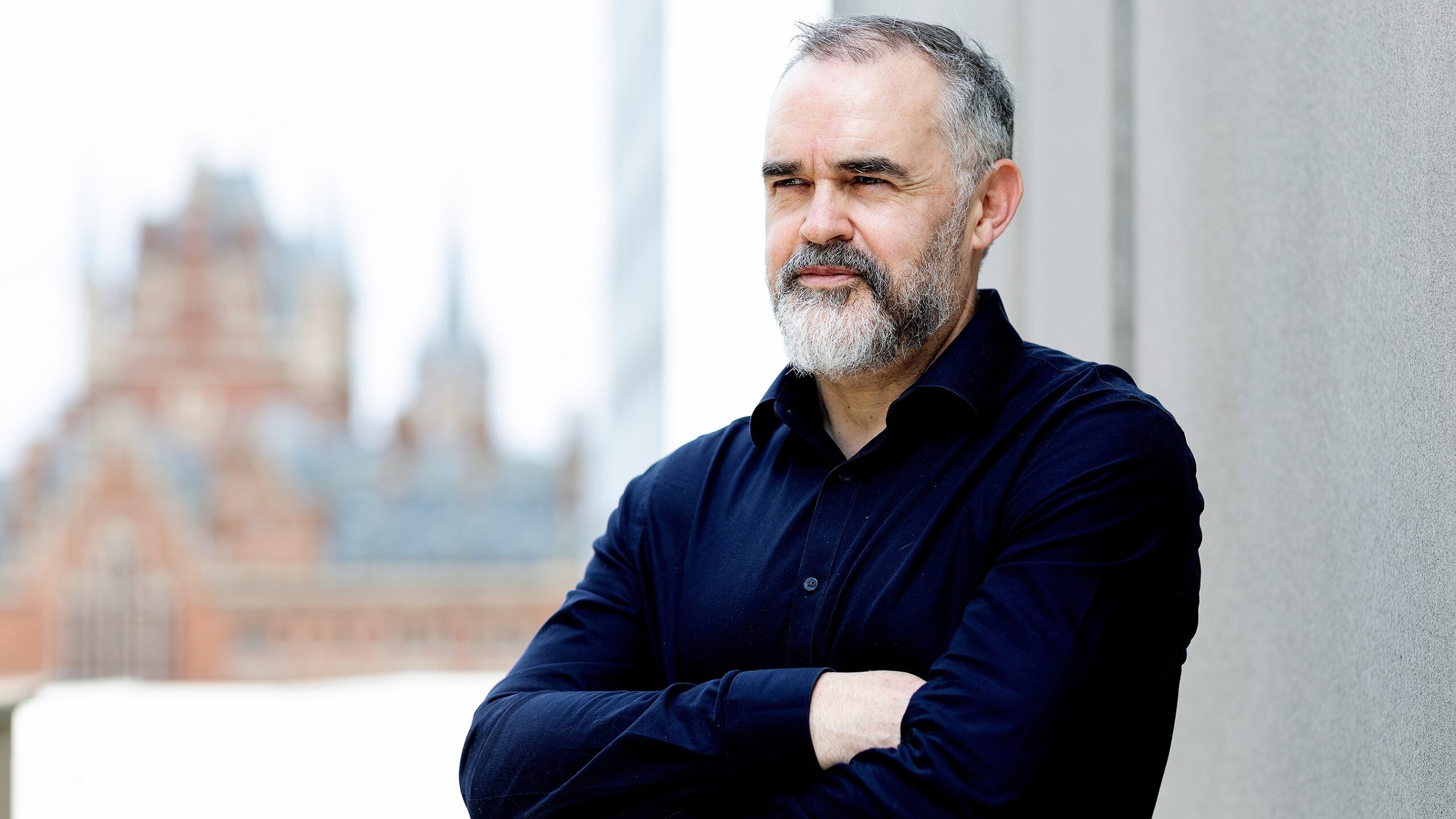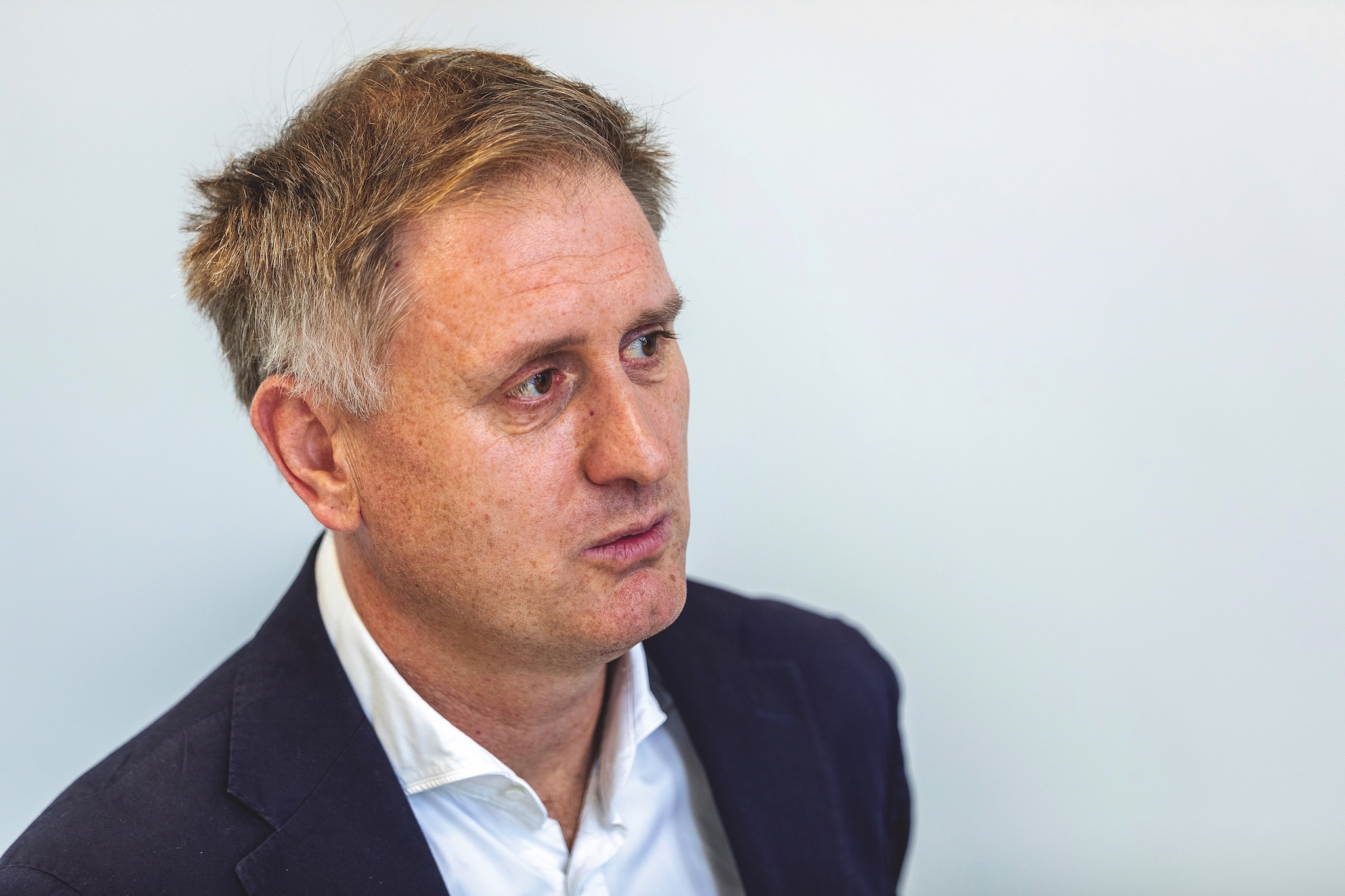“We’ve given NHS management a home—we care for it and campaign for it”
MiP is 20 years old this summer and its chief executive, Jon Restell, has been there since the beginning. He reflects on the union’s past, present and future in conversation with Healthcare Manager editor Craig Ryan.

“I love this job.” Jon Restell is staring out the window of a UNISON media room in the beautifully refurbished building that used to be the Elizabeth Garrett Anderson Hospital. It’s 20 years almost to the day since MiP started operating out of the FDA’s stuffy old offices next to St James’s Park tube, and while almost everything about the union has changed—its size, reach and influence, its staff and head office (three times) and its magazine—one thing hasn’t: Jon Restell is still here. Why?
He talks about being “deeply loyal to MiP because I set it up” and how he “really likes NHS managers as people”. The way they’re treated and spoken about “is just unfair”, he says. Despite their seniority, managers are “a bit of an underdog and, if you find unfairness difficult, as I do, then you’re naturally attracted to an underdog.”
But most of all, he just loves the job. All of it. “As an omnivore, terrified since school of specialising in one narrow field of life, I’m as interested in our email system as the ten year plan,” he explains. The work keeps changing, “so I feel like I’ve had three or four different jobs with MiP,” he adds. “If I ever felt it was just more of the same old thing, I’d go and do something else. But when I look at this job or that job, it never feels like it’s going to be quite as rewarding or fulfilling.”
‘You need members who are leaders’
The organisation Restell was midwife to is the offspring of two unions, the FDA and UNISON, which both had NHS managers as members but didn’t feel they could fully support them. MiP has long since grown up, but the ‘partner unions’ still play a big role, he says.
Broadly speaking, the FDA provides “organisational infrastructure”, things like information management, finance, subscription collection and HR, while UNISON brings its industrial heft and bargaining strength within the NHS. A partnership board, with representatives from both unions, provides “leadership and management capital”, he adds, “because otherwise it would be quite lonely and difficult doing all these governance functions on our own”.
“MiP has become more like a traditional trade union over time, but we were a bit behind the members because of how we were set up,” Restell says. “We thought managers wanted more of a professional body than a trade union, and wouldn’t be interested in other forms of activism.” That was quickly disproved: within a week MiP had its first request to become a rep and within two years it was negotiating on organisational change and running conferences.
The driving force behind this shift, he says, was MiP’s elected National Committee, led by chair David Amos. “You need members who are leaders, who can shape the future of the organisation, because their views will be very different to what a bunch of [professional] trade unionists think managers want from a union,” he says.
By quickly establishing its own identity, MiP was able to overcome initial scepticism, both from managers who feared it was “a front for UNISON”—memories of the union’s vociferous campaign against NHS trusts “was still quite raw for people”, Restell says—and from some UNISON branches, who saw MiP as a “bosses union” whose reps were “management spies reporting back after each meeting”.
Now, most UNISON branches “are proud that many of their senior staff are in MiP”, he says, “and I think we’ve given many UNISON activists some insight into how difficult health service management is.”
A sharper organisation
But it’s MiP’s rapidly growing reps network that “has transformed our profile, reach, and influence” in the last five years, Restell says. With almost 200 members representing colleagues and negotiating with employers, “a lot more people are talking about us now.”
Workplace reps can “reach into places” that MiP’s full-time national officers can’t, he explains. “Many are managers of some influence in their own right; they can nip problems in the bud, coach people and have informal conversations with the employer.”
But with this comes a step change in members’ needs and expectations. “People don’t become reps just because they love casework or banging the table in negotiations—they want to be part of a campaign for change”, he says. “They want to be involved in policy and have a voice in the leadership. I think that’s the biggest single thing that has made us sharper as an organisation.”
The reps network, alongside regular email bulletins, surveys, consultations, this magazine and the website, have helped MiP to boost its member participation massively since the early days. And the union is still small enough for its leadership to be responsive to individual members. “We often get email suggestions and think, that’s a great idea, let’s work with that,” says Restell. At conferences, he prefers talking to people on the MiP stand “because I get more from that than being in the room listening to a speech or trying to get onto the stage.”
MiP’s regionally-based national officers are the other key ingredient to MiP’s success and resilience, he says. As well as “doing amazing casework, often representing people in very difficult situations”, they have “nurtured relationships with employers and other unions”, and “some are becoming real players in their local health systems”, he adds. And without national officers “spotting talent and supporting people to become established in the workplace,” there would be no reps network.
A home for managers
I ask what MiP has achieved for managers in 20 years. I’m expecting a long list of boring bullet points, but Restell’s answer is simple and direct, though entirely unrehearsed: “We’ve given NHS management a home, and an organisation that cares for it and campaigns for it.”
‘We’ve always been determined to be a UK-wide union’

“We’ve always been conscious of the size of England relative to other parts of the UK,” says Jon Restell, explaining why Scotland, Wales and Northern Ireland have reserved seats (almost a third of the total) on MiP’s National Committee. “We wanted to make sure the devolved nations always had a voice. We’ve always been determined to be a UK-wide union.”
MiP membership is growing fast in the devolved nations—particularly in Wales and Northern—reflecting the shared interests and concerns of managers in all four nations. “I think everyone’s concerned about professionalism, reputation and effective management, Restell says. “I can give the same talk about the need to invest in managers and value their role to the public in any of the four countries.”
In contrast to the high drama of the NHS in England, with constant cuts and reorganisation, the devolved nations might seem calm, even “benign”, he says, but managers face all the same day-to-day pressures: bullying, excessive workloads, underfunding, staff shortages and discrimination.
“And some of the ‘political pressure’ bullying can actually feel more acute in the devolved nations because politicians have a far more direct relationship with managers than in England,” he explains.
He expects managers in Scotland, Wales and Northern Ireland to come under similar pressure to cut management costs as colleagues in England. “There are the same perceptions of too many organisations and too much bureaucracy, so that agenda will play out everywhere,” he warns. “One thing we need to do across the healthcare industry as a whole is learn and share more about what’s going on. And MiP has a big role in doing that.” | CR
This was MiP’s defining purpose from the start, he points out: “the best way to organise workers is to find an occupational group, because their professional identity is what they share in common.” Managers, few in number, are “often quite isolated even within their own organisations. And frankly, they’re singled out, and that creates a powerful sense of group identity,” he says.
He senses the “mood music” may have changed in recent years, with some politicians and journalists prepared to think—and even talk—positively about management. But the public discourse remains overwhelmingly hostile—all the more so since Wes Streeting decided the NHS was ‘over-managed’ after all. In any walk of life, the bosses are rarely popular, but the intensity of public antagonism towards NHS managers is peculiar, and not easy to explain.
At bottom, public understanding of the NHS is limited to “the clinical experience”, Restell says. “There’s a sort of ‘Carry On’ view of the health service, as just matron, the consultant and the hospital ward. And we’ve never had a political or NHS leadership that has seriously tried to challenge that.”
This means the optimum ‘amount’ of management will always be the minimum, and the answer to any problem is always to move resources to the ‘frontline’. “It’s become a political and media habit to describe NHS management as a cost or, at best, a necessary evil,” Restell says. “It’s very rare to hear a management role described as an investment in healthcare, improvement or productivity.”
It also leaves managers as a very convenient “lightening rod” when things go wrong, he adds: “Perhaps politicians need an explanation that preserves the public’s core belief in the NHS, doesn’t blame nurses and doctors but keeps them relatively clean from responsibility.”
Restell describes two damaging caricatures of managers that he says MiP wants to knock down: the “mill-owner”, a hard-hearted bean counter who doesn’t care about patients, and the “magician”, someone who’s expected to solve problems and turn around services through sheer force of personality.
“Our message is that managers are neither—they’re just workers with the skills and experience to organise and support care,” he says. “I’ve rarely sat down with a manager and not been able to explain afterwards the value of what they do. We want to help managers tell their own story in a way that has absolute human impact.”
Goodwill has ‘evaporated’
It’s a message the government really needs to hear as it embarks on another major reform of the English NHS by again targeting managers as the problem not the solution. Speaking before the government unveiled its Ten-Year Plan, Restell says he’s “disappointed” by the government’s “crazy, chaotic announcements”, but that feels like understatement. They carry the force of a betrayal.
“I think they wanted a big symbolic act to show they were taking on the state, that they knew how to reform, how to be tough,” he says. “At the end of the day, what’s being done is a financial reset of the NHS. That’s the driving force behind everything.”
The “fair amount of goodwill” among managers towards the new government “has evaporated in the last couple of months, and it’s going to be quite a job to restore confidence,” he warns. The management cuts in NHS England, ICBs and trusts “are taking out huge swathes of the very workforce ministers will need to deliver both their long-terms plans and the financial reset”, he says.
Ministers know full well that “what people want is better administration, better digitisation, and better management of resources and care,” he adds. “That’s all work for people who aren’t clinicians.” Is there any hope? “If they’re sensible” the government will slowly start to adjust their plans”, he says wryly.
With the Ten-Year Plan now having to be retrofitted to the drastic cuts already announced, the NHS needs to make “a brutally honest assessment of what can be done and by when”, he says. With the financial reset and fallout from the cuts likely to consume most management energy for the next two years, “it won’t be until year three or four that we can really start investing in transformation,” he warns.
Ironically, he says, this “grim scenario” around the ten year plan will place “quite a premium on excellent management and management investment”, he says—so we can expect MiP to be far more engaged in “campaigning for and promoting management”, not just externally, but within the NHS.
On the park, playing the ball
In the early days, MiP supported a manager from Kent caught up in a local care scandal. She was new in the job and, like so many others, was trying to turn round the very difficult situation she’d walked into. “She was a convenient scapegoat for the higher ups and the politicians. A campaign group had been formed and they were gunning for her too,” Restell recalls.
In a “pretty hostile” media interview, Restell set out MiP’s defence: she hadn’t been responsible, she’d tried to make changes to stop it happening, it was a complex situation and it wasn’t in the public interest to heap all the blame on her. “People started ringing up, saying things like, ‘My mum heard that and thought that woman had been really unfairly treated’,” he says. “We got a lot of feedback that just putting out an alternative viewpoint is enough to make people think there’s more to it than these lazy tropes about managers.”
It’s still an uphill struggle but twenty-odd years later Restell is still convinced there’s an audience for MiP’s message about the value of management and why we need to invest in NHS managers.
“We’ve got to be on the park playing the ball, or trying to play it,” he says. Much of the commentary is so irrational and unfair, “managers feel bullied out of the limelight”, and unable to defend themselves through fear or embarrassment. “I’ve met reps who always describe themselves as a ‘senior nurse’, if they’ve got that background, rather than say they’re an NHS manager. We can’t go on like that. One thing MiP can do is be there and make sure there’s an alternative story. And I think that can have a big impact.” //
Related Stories
-

Daniel Elkeles: “There’s a lot of green shoots here—the NHS is in a much better place”
As NHS Providers annual conference gets underway in Manchester, we speak to chief executive Daniel Elkeles about next year’s merger with the NHS Confederation and the future for NHS trusts in England. He tells Alison Moore that providers are “well placed” to deliver the Ten-Year Plan—but warns an unhappy workforce and a lack of investment could throw big spanners in the works.
-

Angela Hillery: “Nobody can do this on their own”
Angela Hillery, chief executive of community trusts in Northamptonshire and Leicestershire, is one of England most influential NHS leaders and a pioneer of collaborative working. She talks to Craig Ryan about why integrating services offers the best chance of overcoming a hostile environment and turning the NHS around.
-

“Showing kindness and trust creates a virtuous circle – people respond well to that”
As chief executive of Suffolk and North East Essex, one of England’s most highly rated integrated care boards, Ed Garratt has pioneered a radically different approach to leadership – one based around kindness, trust and putting down deep roots in local communities. He talks to Healthcare Manager’s Matt Ross.
Latest News
-

Job vacancy: MiP Assistant National Organiser
MiP is looking to recruit an Assistant National Organiser on a 14 month fixed term contract. Applications close: 4 March 2026.
-

FDA General Secretary Election 2026
Please find important information regarding the FDA General Secretary Election 2026 which MiP members may participate in.
-

Government proposal for sub-inflation pay rise “not good enough”, says MiP
Pay rises for most NHS staff should be restricted to an “affordable” 2.5% next year to deliver improvements to NHS services and avoid “difficult” trade-offs, the UK government has said.